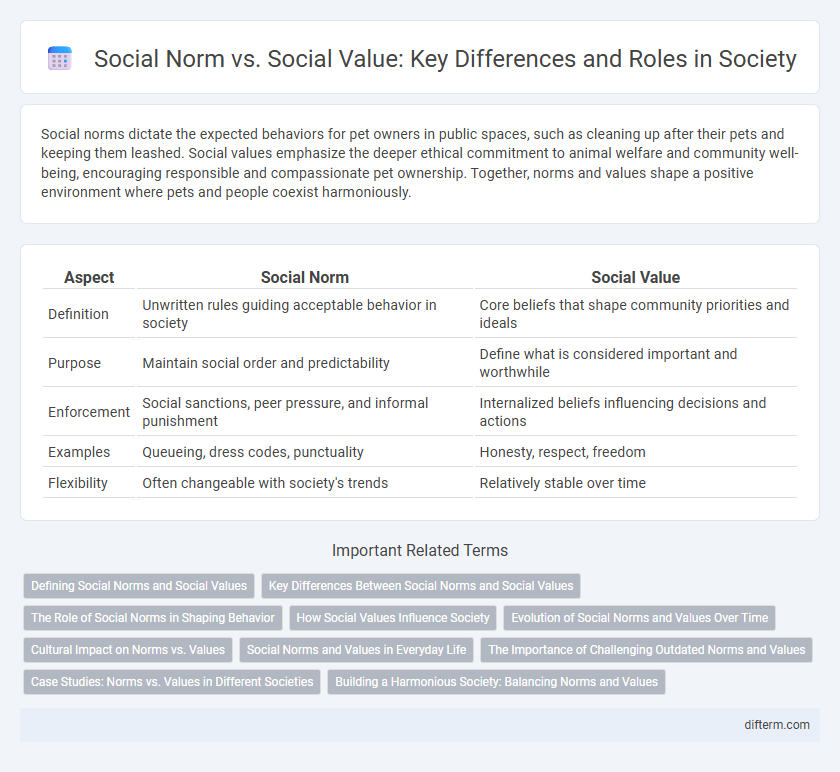Social norms dictate the expected behaviors for pet owners in public spaces, such as cleaning up after their pets and keeping them leashed. Social values emphasize the deeper ethical commitment to animal welfare and community well-being, encouraging responsible and compassionate pet ownership. Together, norms and values shape a positive environment where pets and people coexist harmoniously.
Table of Comparison
| Aspect | Social Norm | Social Value |
|---|---|---|
| Definition | Unwritten rules guiding acceptable behavior in society | Core beliefs that shape community priorities and ideals |
| Purpose | Maintain social order and predictability | Define what is considered important and worthwhile |
| Enforcement | Social sanctions, peer pressure, and informal punishment | Internalized beliefs influencing decisions and actions |
| Examples | Queueing, dress codes, punctuality | Honesty, respect, freedom |
| Flexibility | Often changeable with society's trends | Relatively stable over time |
Defining Social Norms and Social Values
Social norms are unwritten rules governing acceptable behavior within a group, shaping everyday interactions and expectations. Social values represent the core principles and beliefs that guide individuals' judgments about what is important and morally right. Understanding the distinction between social norms and social values is crucial for analyzing how societies maintain order and foster cultural identity.
Key Differences Between Social Norms and Social Values
Social norms are unwritten rules that govern behavior within a society, guiding what is considered acceptable or unacceptable in specific contexts. Social values represent the deep-seated beliefs and principles that a community holds, shaping long-term goals and priorities across cultures. The key difference lies in norms being behavioral expectations while values are foundational ideologies that influence those norms.
The Role of Social Norms in Shaping Behavior
Social norms function as informal rules that govern behavior within a group, shaping individual actions by signaling what is considered acceptable or unacceptable. Unlike social values, which represent deeply held beliefs about what is important, social norms are situational and can change rapidly based on context or group dynamics. The enforcement of social norms through social approval or sanctions significantly influences conformity and collective behavior in societies.
How Social Values Influence Society
Social values serve as the foundational beliefs that shape behavior, guiding societal expectations and influencing collective decision-making. These values inform social norms, which are the unwritten rules governing daily interactions and maintaining social order. By reinforcing shared principles like respect, equality, and responsibility, social values strengthen community cohesion and drive ethical conduct within society.
Evolution of Social Norms and Values Over Time
Social norms and values have evolved significantly across cultures, reflecting changes in collective beliefs and behaviors driven by historical events, technological advancements, and increased global interconnectedness. The transition from rigid, tradition-bound norms to more inclusive and diverse social values illustrates society's adaptation to contemporary challenges such as gender equality and environmental sustainability. Understanding the dynamic interplay between enduring social values and emerging norms is essential for analyzing social cohesion and cultural transformation.
Cultural Impact on Norms vs. Values
Cultural impact on social norms shapes behavior patterns by establishing accepted rules within a community, while social values influence deeper moral beliefs guiding individual and collective decisions. Norms often evolve more rapidly due to external cultural shifts and social interactions, whereas values tend to remain stable, reflecting core cultural identity and heritage. Understanding this distinction is critical for analyzing how societies adapt to change while preserving foundational principles.
Social Norms and Values in Everyday Life
Social norms are unwritten rules that govern behavior in specific situations, guiding individuals on what is considered acceptable in everyday interactions. Social values represent deeply held principles that shape attitudes and priorities within a community, influencing choices and judgments beyond immediate contexts. Together, social norms and values create a framework that maintains order and fosters cooperation in daily social life.
The Importance of Challenging Outdated Norms and Values
Challenging outdated social norms is crucial for fostering inclusive and progressive communities that reflect current ethical standards and human rights. Social values evolve to promote equality, respect, and innovation, while rigid norms can perpetuate discrimination and hinder social growth. Reevaluating and revising these norms ensures that social behavior aligns with contemporary collective well-being and justice.
Case Studies: Norms vs. Values in Different Societies
Case studies reveal that social norms and social values often diverge across societies, shaping distinct cultural behaviors and expectations. In Japan, for instance, the social norm of group harmony aligns closely with the value of collectivism, whereas in the United States, norms encouraging individual expression reflect the core value of personal freedom. These differences illustrate how social norms serve as behavioral guidelines rooted in deeper, society-specific values.
Building a Harmonious Society: Balancing Norms and Values
Social norms provide structured guidelines for behavior within a community, while social values represent the deeper ideals that shape collective priorities and ethics. Balancing these elements fosters mutual respect and cooperation, essential for building a harmonious society. Emphasizing shared values alongside flexible norms encourages inclusivity and social cohesion across diverse groups.
social norm vs social value Infographic

 difterm.com
difterm.com